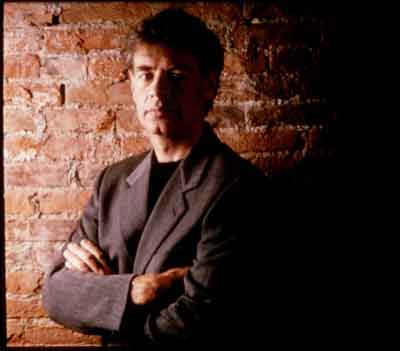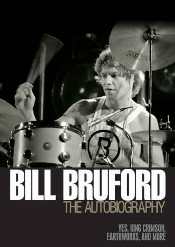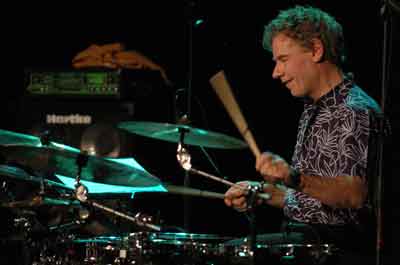
Bill Bruford
In the Key of C Major
Carl F Gauze
Drum Legend Bill Bruford recently retired from the rock and roll business to promote his dual labels, Summerfold and Winterfold. His new book Bill Bruford – The Autobiography tells the story of his career and his approach to music, but Ink 19 reporter Carl F Gauze recently chatted with him to discover the facts behind the claims. Here’s a transcript
• •
How’s retirement treating you? Are you just as busy today as you were when you were officially working? Are you spending most of your time in Surrey, or are you still traveling?
Same only busier! It’s just that I don’t have the admin of shipping a band around the world, or the practice schedule needed to stay up on the instrument. I run two small labels, Summerfold and Winterfold Records, and they take plenty of time. We’ve released some thirty titles across the two labels now. This September, Summerfold is releasing a new CD by British composer Colin Riley called Skin and Wire with yours truly on drums, and Winterfold has the only live Moraz-Bruford archive piece called In Tokyo, recorded 1985. I run a website, answer endless questions, and have just written an autobiography (of sorts!).

What sorts of projects interest you now that you’re not touring?
I have several speaking engagements at [the] college and university level in the UK on the subject of issues raised in my recent book. I suspect there are other musicians like me who look forward to a sense of relief when they put down the instrument after a lifetime, which can come to seem a burden. This is not much talked about in the glossy magazines, but I am tangentially interested in the world of performance anxiety, and stress or burnout, and how musicians may find ways of coping with difficulties: dove-tailing work and family, the public and private, physical and psychological health. My book has created some interest because I am not afraid to write about my personal experiences in these areas.
I am interested too in the problems facing the next generation of players, particularly for drummers. Interest in rhythmic adventure at the mass-market level seems to be diminishing, while prodigiously well-equipped drummers seem to be able to do so much more than is required of them. It is hard for them to fashion a music that speaks to the man in the street but may also contain state-of-the-art rhythm stuff that challenges the performer.
What do you see as the important differences between jazz drumming and rock drumming?
How long have you got? Rock is about the production and sale of a consistent product, jazz is a work in progress, a personal journey to enlightenment that you are invited to observe. Rock is about doing it the same every night, jazz is about doing it differently every night. Rock is about the song, instrumental jazz is about the depth of expression achievable by the instrumentalist. Rock drumming, therefore, will tend to be a consistent, unambiguous, smooth and unchanging rhythmic bed on which the lyrics are laid; jazz drumming will require every ounce of control the player has in his exploration of every nuance of the instrument as seems appropriate given the ever-changing musical scenario around it. One is a more sophisticated version of the other. You choose which!
Do you compose differently for these genres?
Apart from some riffs and rhythmic ideas for Yes and King Crimson, I don’t think I’ve ever composed any rock. Jazz composition needs the minimum necessary to get the musicians going. It’s often only an excuse to start playing, really. A common mistake for beginners, like me, is to write something that’s either too dense or too fussy. The composition often has a tendency to get in the way of the music. I’m getting better at it though.
Who are the exciting new drummers that you’re seeing? What makes them exciting or interesting?
Well, there are so many. You might know Mark Guiliana from Avishai Cohen’s group – stunning. Asaf Sirkis is an Israeli Brit bringing a lot of Middle-Eastern stuff to the kit. On the rock side, the girl [Sarah Jones] from Bat for Lashes is good, too. They all bring interesting or unusual approaches with sufficient technical capability to realize them effortlessly. They’ve found a niche to work in where they can be themselves and fashion their own sound and identity. The new guy with Gwilym Simcock from the Royal College here in London is bound to be amazing too, otherwise Gwil wouldn’t have hired him. If you don’t know these names, there is something called Google…
I see you’ve released four of your early albums on 180 gram vinyl. How do you feel the sound and listening experience on these discs compare to the original vinyl releases, CD audio, and the sort of compressed music that the world is awash in?
I’m no audiophile, and no reactionary, but I must say the sound of the original and the 180 gram vinyl stuff does send shivers up my spine. But, generally I think CD is a fine idea – I never want to go back to the scratchy old vinyl that I grew up with – but for me it’s all about the music, not the carrier. I grew up on old Coltrane records recorded with one mic in a Japanese jazz club somewhere. If you could hear any bass at all you considered yourself lucky. So if I can hear the musical intent clear as a bell, I’m happy. I hate all that compression sizzling away on radio. All the musicians I knew were the last guys on the block to get fancy hi-fi systems.
I’m completely impressed with the detailed layout of your drum kits through the years on your web site (prepared by Rodrigo Delaveau Swett). Did you help him put that together? Do other drummers keep such exacting records? Do you keep similar records of other aspects of your personal or professional life?
Rodrigo did well there, didn’t he? That kind of detail bores the pants off me, but drummers love detail. I don’t collect drums or nurture them or salivate over them. Usually it’s just a rental set these days or something Tama drums have provided for me to play – so I only play my own kit at home and local UK gigs. I happen to have a note about the gigs I’ve played – I started and then couldn’t stop – which is how come I know I played 2,885 in 41 years. Not as many as it sounds.

How do you perceive the relative merits of the old, “Get an A&R guy interested in me” vs. the new, “post my work on the ‘net and hope someone finds it” model? Is it easier or harder for young artists to get noticed?
Are there any A&R guys left? I thought the last one out had switched off the light. I think “posting it on the net and hoping” has something going for it, but you can do better. In a world in which everyone makes CDs in their bedrooms and everyone is a guitarist or a drummer, it’s obviously harder to get noticed, because everyone is screaming, “Look at me” at the same time. I think the trick is to think local, act global, and expand one town at a time. Get with like-minded guys and play the music you want – the stuff that you must play because you’ll blow up if you don’t – to two men and a dog if necessary. All the good stuff I’ve heard has been in some crap club somewhere – by the time it gets to Madison Square Gardens it’s usually rubbish. You may have to do a day gig to support yourself – cab driving, cover bands, and teaching are honorable occupations. Yes started out as a cover band, but then quite quickly grew fancy bits. But if you can survive and play the stuff you want two nights a week, you’re winning. Everything else is just a matter of expanding on that.
Have you kept control of most of your music over the years? Your biography points up the very abusive relationship between managers and artists early in your career. At what point were you able to break out of that mold and get a fair deal from the industry? Do you see the current industry as more or less fair to the newcomer?
Robert Fripp of King Crimson did heroic work on behalf of the small owner-drivers like himself with DGM and subsequently myself with Summerfold and Winterfold Records. We were shabbily treated by the majors way back, who deleted items but wouldn’t allow the artists to re-release. This is close to a legally unacceptable restraint of trade. Since then my catalog has been re-issued along with my new material and I am fully in control. But I have an audience, albeit a modest one. Only the majors still have enough bucks to present you to the audience via radio play and a sustained marketing campaign. I’m not looking for hits – I’m developing a niche market – but I would imagine it is still very tough to get a hit without a major. The few exceptions prove the general rule.
How do you see the digital downloading revolution and the demise of the physical hardware business model?
Too soon to tell, as Zhou Enlai is allegeded to have replied when asked for his assessment of the impact on modern China of the French Revolution.
Does this change the artists’ ability to control and profit from their work, or is this still all about major labels’ profits?
Swings and roundabouts. The niche artist may have total control and a large per-unit profit from a tiny sales base – an awful lot of not much. With a major, you’re going to get very little of an awful lot, if the gamble works.
The RIAA has been aggressively pursuing downloaders. Do you see this as beneficial to the artist?
This is too complex an area for me to get a handle. Whenever it’s raised I usually lie down till it’s gone away.
Have you actually received any “stolen revenue” from any of this activity?
No, I’ve never received any “stolen revenue” although I’ve had plenty stolen. All I know is that like many other occupations, the business of being a musician is now unrecognizable relative to the one I grew up with, and that nobody knows where it’s headed. What remains inviolate, what remains certain and timeless and unchanging, is the skill and patience needed to master a musical instrument. The core skill, it seems to me, is to be able to stop the ordinary person dead in the street with your musical skill and passion on voice or instrument. That’s what we need to concentrate on.

What do you think of the “Three Strikes” rule that recently failed in France, and is under consideration in the UK?
The local music school down the road has teenage experts on RIAA Three Strikes Rules, but it hasn’t got a piano and nobody knows what the dominant 7th is in C major. Our job is music first, business later.
Any closing thought on life, music, or answering questions from the unwashed masses?
The dominant 7th in C major is Bb. Never trust a music school without a piano.












